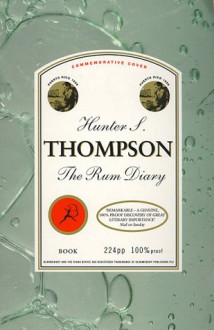"Disgusting as he usually was," Hunter Thompson writes in this, his 1959 novel, "on rare occasions he showed flashes of a stagnant intelligence. But his brain was so rotted with drink and dissolute living that whenever he put it to work it behaved like an old engine that had gone haywire...
show more
"Disgusting as he usually was," Hunter Thompson writes in this, his 1959 novel, "on rare occasions he showed flashes of a stagnant intelligence. But his brain was so rotted with drink and dissolute living that whenever he put it to work it behaved like an old engine that had gone haywire from being dipped in lard." Surprise! Thompson isn't writing about himself, but one of the other, older, aimlessly carousing newspapermen in Puerto Rico, a guy called Moberg whose chief achievement is the ability to find his car after a night's drinking because it stinks so much. (I can smell it for blocks, he boasts.) The autobiographical hero, Paul Kemp, is 30, trapped in a dead-end job (Thompson wound up writing for a bowling magazine) and feeling as if his big-time writer dreams, soaked in F. Scott- Fitzgerald and Ernest Hemingway, are evaporating as rapidly as the rum in his fist. In fact, Thompson was only 22 when he wrote The Rum Diary, but his fear of winding up like Moberg was well founded. What saved him was the fantastic conflagration of the 1960s, a fiery wind on which the reptilian wings of his prose style could catch and soar to the cackling heights of Fear and Loathing in Las Vegas. Puerto Rico in 1959 doesn't have bad craziness enough to offer Thompson--just a routine drunken reporter stomping by local cops and a riot over Kemp's friend's temptress girlfriend, a scantily imagined Smith College alumna who likes to strip nude on beaches and in nightclubs to taunt men. Thompson's prose style only intermittently takes tentative flight-- compare the stomping scenes in this book with his breakthrough, Hell's Angels --but it's interesting to see him so nakedly reveal his sensitive innards, before the celebrated clownish carapace grew in. It's also interesting to see how he improved this full version of the novel from the more raw (and racist) excerpts found in the 1990 collection Songs of the Doomed --Tim Appelo, Amazon.com
show less

